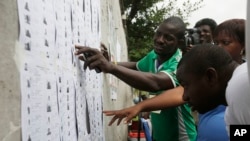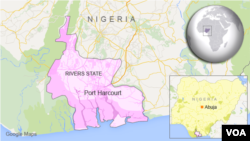As Nigeria vows to stifle unrest during this weekend’s election, some voters say they remain too scared to cast ballots.
Despite assurances from Nigerian President Muhammadu Buhari, who says security forces will crack down on anyone who incites violence during Saturday's local and federal legislative elections in oil-rich Rivers State, the country remains on edge.
And the concerns aren't unfounded. Nigeria's two main political parties have accused each other of inciting violence ahead of this weekend's polls, and the All Progressives Congress (APC) Party says dozens of its supporters in Rivers State have been killed in the run-up to the vote.
Austin Tam-George, a spokesman for the state government, which is controlled by the Peoples Democratic Party, said the killings were the fault of gang members.
He accused the state's former APC governor of inciting violence.
A police spokesman declined to comment.
‘Everybody is apprehensive’
Livingstone Membere, a youth leader in the Akuku-Toru area of Rivers State, says he has seen people killed and their bodies set on fire in recent days.
"Everywhere is tense, everybody is apprehensive. So it might [reduce] the turnout," he said.
Rivers State and its capital, Port Harcourt, are home to major sectors of Nigeria's oil industry. The country is Africa's largest producer of crude, which brings in about 90 percent of its export earnings.
Sofiri Joab-Peterside, a sociology teacher at the University of Port Harcourt, says the struggle to control that oil wealth is one reason for the state's do-or-die political atmosphere.
"Every political party sees the region as an area where it needs to deploy its power to make sure that it wins election," Joab-Peterside said.
Unfortunately, says Anyakwee Nsirimovu of the Institute of Human Rights and Humanitarian Law in Port Harcourt, if voters stay away, then the killings have served their purpose.
"The [fuller] sense of killing is to put fear into people, to stop people from coming out to exercise their civic responsibilities,” Nsirimovu said. "When you do that, when you don't have people at the polling units, of course politicians can get their way."
The re-elections were ordered by a tribunal convened to answer challenges to last year's governorship and legislative elections.













